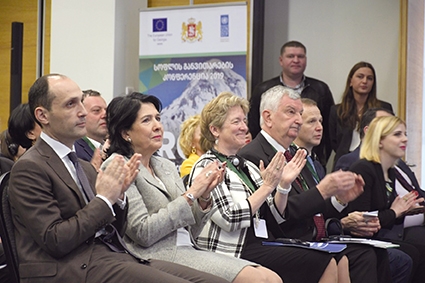Conference on Rural Development in Georgia
Last week, Tbilisi hosted the 2019 Georgia Rural Development Conference. The conference, officially titled ‘Rural Development Policy 2020+, Translating European Practice into Georgian Reality,’ was a space to discuss prospects and ways forward down the country’s rural development path. Leading experts and policy makers from Georgia and European Union (EU) member states gathered at Expo Georgia on Monday, April 8, for a day of speeches and panel discussions.
The Rural Development Conference was organized by the Ministry of Environmental Protection and Agriculture of Georgia with the assistance of the EU in cooperation with the United Nations Development Program (UNDP).
The conference was opened with remarks from Georgian President Salome Zurabishvili, who emphasized the importance of rural development and Georgia’s regions for the overall success of the country. Welcome remarks followed from Levan Davitashvili, Minister of Environmental Protection and Agriculture of Georgia, Carl Hartzell, Ambassador of the European Union to Georgia, and Louisa Vinton, UN Resident Coordinator / UNDP Resident Representative in Georgia.
The Rural Development Conference aimed to assist the Government of Georgia to set priorities for the national Rural Development Strategy 2020-2027. Participants also discussed ways of adapting successful European practices to Georgia’s realities.
“Georgia has made notable progress since 2016 when the country’s first Rural Development Strategy was adopted,” said Minister Davitashvili. “The Government of Georgia has introduced a new vision of rural development grounded on the best EU practices in this field. In the next seven years, we will focus on promoting local entrepreneurship and employment and increasing people’s engagement in the rural development process.”
Later, Ambassador Hartzell spoke on the role of the European Union as a supporter and model for Georgia’s progress towards shared European values. “We are proud to be part of Georgia's progress in rural development and look forward to continuing working together with all key ministries to improve employment and living conditions of the rural population in Georgia,” said Hartzell. “European experience implemented in Georgia has demonstrated the benefits of a bottom-up approach in rural areas, empowering local people to take the development of their communities into their own hands.”
The UNDP, co-organizer of the conference, has played an active role in Georgia’s rural development in recent years, including contributing significantly valuable research in the field. “Rural development can help unlock the biggest socio-economic challenge facing Georgia, namely that farmers make up 43% of the workforce yet produce just 8% of the GDP,” Louisa Vinton shared. “The new strategy will aim to narrow this gap by helping to make Georgia’s farms more professional and competitive, creating new non-farm jobs in rural areas and improving living conditions for rural communities.”
Former Chief Negotiator for EU accession on behalf of the Ministry of Agriculture of Hungary, Dr. Lászlo Sandor Vajda, spoke to the assembled audience on considerations for moving towards new agriculture and rural development programming in Georgia based on Hungary’s experience joining the EU.
Markus Hopfner, Deputy Director General of the Federal Ministry of Sustainability and Tourism of the Republic of Austria shared his country’s experience in implementing EU rural development policy.
Minister of Regional Development and Infrastructure, Maya Tskitishvili, and Minister of Economy and Sustainable Development, Giorgi Kobulia, joined a panel with Dr. Sandor Vajda, Hopfner, and Nino Evgenidze, Executive Director of Economic Policy Research Center on a panel to discuss, in practice, how Georgia may be able to adapt EU standards and policies to its national context, and the challenges the process will introduce.
Khatia Tsilosani, Deputy Minister of Environmental Protection and Agriculture, shared her ministry’s outlook on the new, integrated Agriculture and Rural Development Strategy (ARDS) beyond 2020. Surprising most of the audience, the ministry currently has no plans to include Local Action Groups in their strategy. Local Action Groups and the LEADER principle of bottom-up, grassroots rural development has been the central tenant of the EU’s ENPARD Program, a nine year, 179.5 million EUR support scheme. Under ENPARD, Local Action Groups, which bring together local government, private sector, and civil society representatives to create local development strategies and provide strategic policy guidance from a local perspective, have been established in 12 municipalities in Georgia. They join a network of hundreds of Local Action Groups across Europe. The Ministry of Environmental Protection and Agriculture plans to release the official ARDS Beyond 2020 in the coming months.
By Samantha Guthrie
Image source: UNDP











